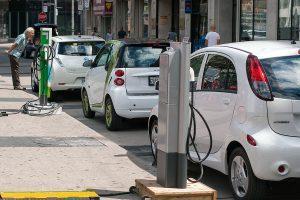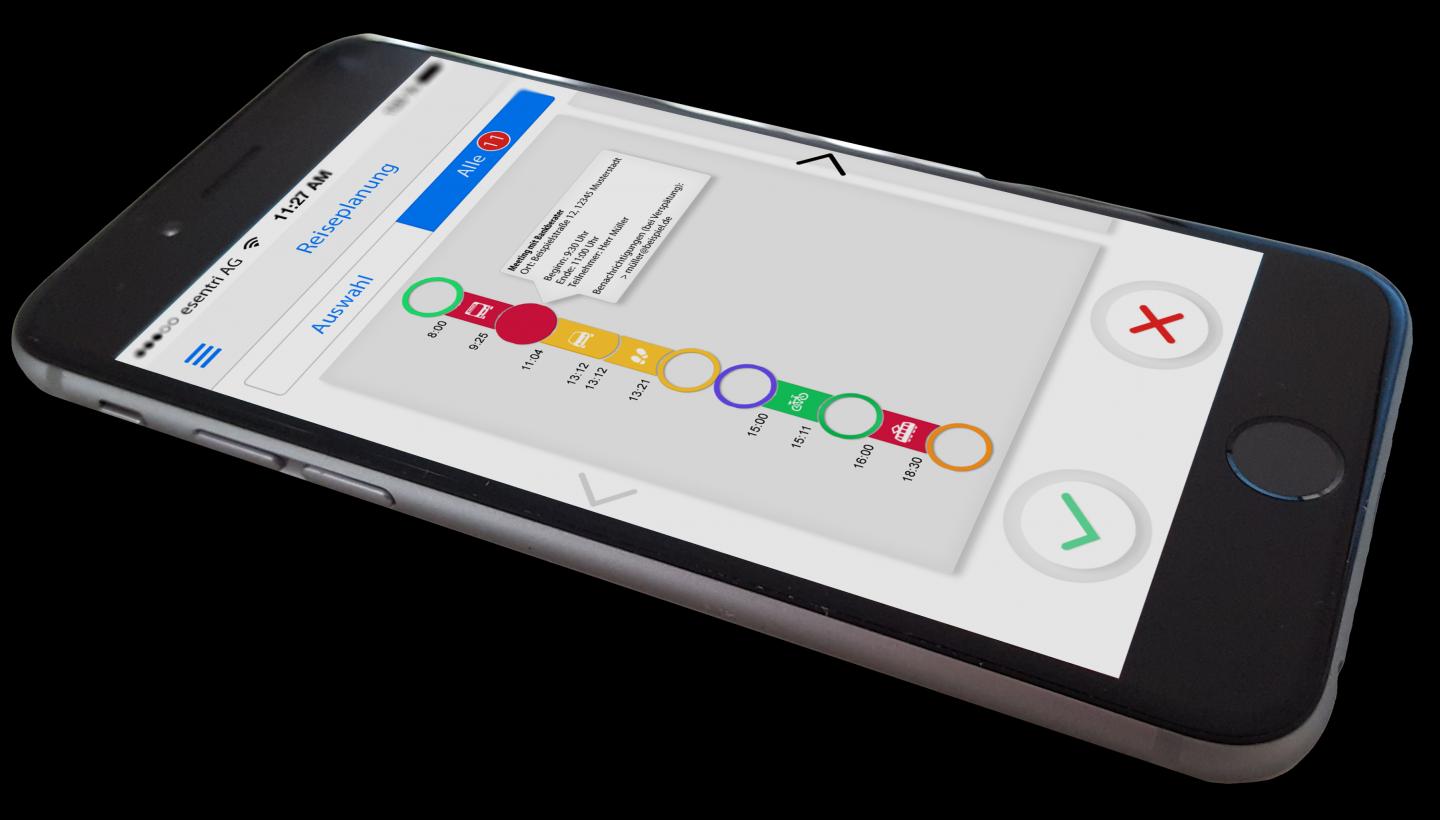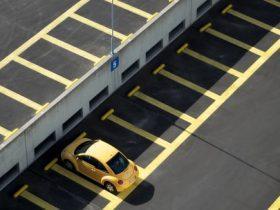Each activity in daily life might require a different form of mobility, and sometimes it makes sense to link some appointments.
In the future, the optimum solution could be suggested by a mobility app. A prototype of an electronic assistant for mobility customers and other tools for providers of mobility services were recently presented by the BiE project.
Our mobility behavior is changing: Attractive public passenger transport services or flexible services such as car sharing are gaining importance. The BiE project (Evaluation of Integrated E-Mobility) focuses on how to better harmonize such services and integrate them into the users’ daily life, find out where e-mobility fits in, and develop corresponding prototypes.
The results include an app that provides personal mobility assistance. Populated with data specifying individual preferences and mobility needs, it is able to make specific suggestions for your personal daily mobility behavior. The assistant not only integrates e-mobility, but all mobility types, such as local and long-distance public transportation services, private motor transport, bicycle, walking, and any combination of them.
The user’s upcoming appointments over the day are matched with the current road traffic and public transportation states so that any possible leeway can be used for travel planning. Such assistance could enable individual users to optimally coordinate their daily routine with their mobility needs, to receive updated suggestions for planning the necessary travel in case of unexpected events, and – as a side effect – to keep their families and appointment partners updated.

Arising from this insight, the question for the BiE project was how big the influence of such an assistance feature could be on the mobility needs of an entire region. The Institute for Transport Studies of KIT investigated this question taking the example of the Stuttgart region.
Calculation models were used to determine the effects: The result was that this assistance feature can significantly reduce the average number and duration of trips as well as the distances to be covered. For half of the use cases, the assistance feature was able to offer advantageous alternatives. The use of electric vehicles for private transport could provide an attractive mobility solution for conurbations such as the greater Stuttgart area.
For fleet operators, BiE concurrently developed a prediction model for the use of e-vehicles that factors in customer preferences, driving behavior, and vehicle consumption characteristics. Thanks to machine learning, a reliable prediction of the distance the user wants to cover and the car in the fleet that is sufficiently charged and has an adequate distance to empty is possible. Building on this data, booking offers and even the daily planning of the fleet bases can be optimized.
BiE is developing another consulting system that will help organizations such as municipalities, companies, or neighborhood communities to deploy new vehicle fleets. Various input parameters, such as organization size, number of persons, and mobility behavior, allow the system to predict reliably whether and under which conditions the introduction of e-mobility makes sense.
The output is a mobility architecture recommendation tailored to the individual needs, including statements on the dimension of investments, infrastructures, utilization, and economic efficiency of e-mobility solutions for almost any environment.
The overall objective of the BiE project is to design an evaluation system for the integration of e-mobility based on key indicators. Possible use scenarios will be simulated and validated prior to their implementation using novel concepts.
The underlying networked mobility models were developed by the Institute of Product Engineering at KIT. With these models, individual recommendations adapted to each situation and based on a holistic system of key indicators became possible. Thus, the BiE partners can identify an appropriate infrastructure of charging stations for vehicle fleets, detect cooperation options of various service providers, or analyze traffic flows.
The BiE (Evaluation of Integrated E-Mobility) project was funded with more than EUR 2 million by the Federal Ministry of Education and Research for two and a half years during the second funding period of the E-Mobility South-West leading-edge cluster.

Eleven partners from different industries actively participated in BiE: Karlsruhe Institute of Technology (KIT) contributed latest scientific aspects through its Institute for Transport Studies (IfV), its Institute of Product Engineering (IPEK), and its FZI Research Center for Information Technology. From the industry, the following companies took part: Bosch, cantamen GmbH, esentri AG, RA Consulting GmbH, Raumobil GmbH, and TWT GmbH Science & Innovation. Two large regional car sharing operators, Stadtmobil Karlsruhe and Stadtmobil Rhein-Neckar, have agreed to act as pilot partners for the technical test phase.
E-Mobility South-West leading-edge cluster
80 players from industry and science make the E-Mobility South-West leading-edge cluster one of the most important regional associations in the field of e-mobility. Managed by the State Agency e-mobil BW GmbH, the cluster is aimed at promoting the industrialization of e-mobility in Germany and making Baden-Württemberg a major provider of electric mobility solutions.
In the future, the optimum solution could be suggested by a mobility app. A prototype of an electronic assistant for mobility customers and other tools for providers of mobility services were recently presented by the BiE project.
Our mobility behavior is changing: Attractive public passenger transport services or flexible services such as car sharing are gaining importance. The BiE project (Evaluation of Integrated E-Mobility) focuses on how to better harmonize such services and integrate them into the users’ daily life, find out where e-mobility fits in, and develop corresponding prototypes.
The results include an app that provides personal mobility assistance. Populated with data specifying individual preferences and mobility needs, it is able to make specific suggestions for your personal daily mobility behavior. The assistant not only integrates e-mobility, but all mobility types, such as local and long-distance public transportation services, private motor transport, bicycle, walking, and any combination of them.
The user’s upcoming appointments over the day are matched with the current road traffic and public transportation states so that any possible leeway can be used for travel planning. Such assistance could enable individual users to optimally coordinate their daily routine with their mobility needs, to receive updated suggestions for planning the necessary travel in case of unexpected events, and – as a side effect – to keep their families and appointment partners updated.

Arising from this insight, the question for the BiE project was how big the influence of such an assistance feature could be on the mobility needs of an entire region. The Institute for Transport Studies of KIT investigated this question taking the example of the Stuttgart region.
Calculation models were used to determine the effects: The result was that this assistance feature can significantly reduce the average number and duration of trips as well as the distances to be covered. For half of the use cases, the assistance feature was able to offer advantageous alternatives. The use of electric vehicles for private transport could provide an attractive mobility solution for conurbations such as the greater Stuttgart area.
For fleet operators, BiE concurrently developed a prediction model for the use of e-vehicles that factors in customer preferences, driving behavior, and vehicle consumption characteristics. Thanks to machine learning, a reliable prediction of the distance the user wants to cover and the car in the fleet that is sufficiently charged and has an adequate distance to empty is possible. Building on this data, booking offers and even the daily planning of the fleet bases can be optimized.
BiE is developing another consulting system that will help organizations such as municipalities, companies, or neighborhood communities to deploy new vehicle fleets. Various input parameters, such as organization size, number of persons, and mobility behavior, allow the system to predict reliably whether and under which conditions the introduction of e-mobility makes sense.
The output is a mobility architecture recommendation tailored to the individual needs, including statements on the dimension of investments, infrastructures, utilization, and economic efficiency of e-mobility solutions for almost any environment.
The overall objective of the BiE project is to design an evaluation system for the integration of e-mobility based on key indicators. Possible use scenarios will be simulated and validated prior to their implementation using novel concepts.
The underlying networked mobility models were developed by the Institute of Product Engineering at KIT. With these models, individual recommendations adapted to each situation and based on a holistic system of key indicators became possible. Thus, the BiE partners can identify an appropriate infrastructure of charging stations for vehicle fleets, detect cooperation options of various service providers, or analyze traffic flows.
The BiE (Evaluation of Integrated E-Mobility) project was funded with more than EUR 2 million by the Federal Ministry of Education and Research for two and a half years during the second funding period of the E-Mobility South-West leading-edge cluster.

Eleven partners from different industries actively participated in BiE: Karlsruhe Institute of Technology (KIT) contributed latest scientific aspects through its Institute for Transport Studies (IfV), its Institute of Product Engineering (IPEK), and its FZI Research Center for Information Technology. From the industry, the following companies took part: Bosch, cantamen GmbH, esentri AG, RA Consulting GmbH, Raumobil GmbH, and TWT GmbH Science & Innovation. Two large regional car sharing operators, Stadtmobil Karlsruhe and Stadtmobil Rhein-Neckar, have agreed to act as pilot partners for the technical test phase.
E-Mobility South-West leading-edge cluster
80 players from industry and science make the E-Mobility South-West leading-edge cluster one of the most important regional associations in the field of e-mobility. Managed by the State Agency e-mobil BW GmbH, the cluster is aimed at promoting the industrialization of e-mobility in Germany and making Baden-Württemberg a major provider of electric mobility solutions.
###
http://www.emobil-sw.de/de/aktivitaeten/aktuelle-projekte/projektdetails/new-content-2.html
For details on the KIT Mobility Systems Center: http://www.mobilitaetssysteme.kit.edu


















